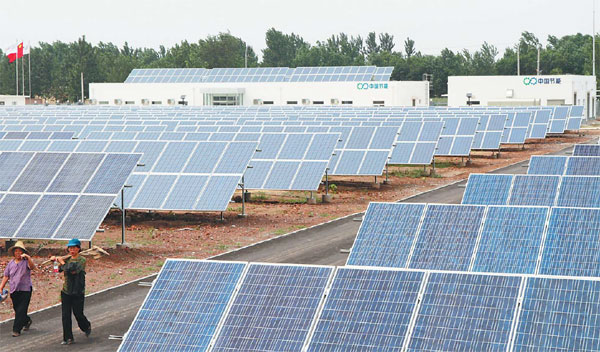Climate change is a lifelong issue
French politician says cooperation at all levels is vital if progress is to be made
French politician Ronan Dantec was deputy mayor of Nantes for 10 years. From 2001 to 2011, he was in charge of the city's climate plan.
Nantes is the sixth-largest city in France, with a population of 600,000, and is committed to fighting global warming.
|
A photovoltaic power station in Dezhou, Shandong province. China's carbon emission rate has slowed down this year. Provided to China Daily |
"In Nantes, when we adopted our first climate plan, our first target was to reduce greenhouse gas emissions by 30 percent by 2020, and we have almost reached it. Now we have a new target: By 2030 we plan to cut greenhouse gas emission in half," he says.
In 2013 Nantes became a Green Capital of Europe, a European Commission title awarded to recognize the efforts of European cities in protecting the environment.
Dantec believes that the ways in which Nantes reduced greenhouse gas emissions are applicable to other cities.
It developed public transport and reduced the number of private cars on the road. In the 1980s, Nantes became the first French city to install the modern tramway. It also developed new energy strategies and is currently developing a district heating system with renewable energy.
Fighting against urban sprawl is also an important mission for Nantes. Living costs are expensive inside the city center so people tend to live on the outskirts, where communities are vehicle-dependent. The longer travel distances of suburban residents generate more carbon emissions.
To resolve the urban sprawl issue, Nantes designed an urban planning framework: 5,000 new buildings have been constructed each year in the city since the 1990s.
Transport policy is coordinated with housing policy to encourage people to reduce carbon emissions, "Fifty percent of public transport charges are subsidized for people who decide to use public transport," says Dantec.
But the Frenchman says that the Nantes approach needs to be adjusted when it comes to China.
"One question for China, I think, is to develop medium-sized cities, instead of focusing on metropolises. In France the situation is different, we have the capacity to have more people in the city."
Besides the measures taken by local government, it is important that policymaking be based on citizen involvement.
"If we want to change people's daily life, we need to communicate with them more," says Dantec.
In 2005 Nantes was engaged in Agenda 21, a United Nations plan regarding sustainable development. A lot of residents in Nantes were mobilized to exchange their thoughts with local government about sustainable development priorities.
"In the end we agreed upon 21 actions and our first was the climate plan, which became the priority of the city," says Dantec.
In 2010 the city contacted 150 households to understand their priorities and needs for a greener life. The participants gave their opinions about public services and proposed their solutions to climate change.
"We must exchange more with other cities in the world, and Chinese cities may be our first consideration in the future," Dantec says. Nantes also has a twin city relationship with Seattle in the United States.
"We compare our strategy with that of Seattle. It is interesting to see that our climate policies are very similar."
Dantec believes that local governments are not sufficiently represented in international climate negotiations, so cities and territories need to adjust their strategies.
Accordingly the Rhone Alpes Region is hosting a world summit on climate and territories in July in Lyon, bringing together non-state actors and local governments to fight climate change.
French President Francois Hollande is set to give a speech at the summit, which is a key event ahead of world climate talks in Paris at the end of the year.
Dantec says: "The world's greenhouse gas emissions are the result of greenhouse gas emissions from all regions. It is impossible for the national government to achieve its target without the mobilization of every city and region".
In Lyon delegates will develop proposals aimed at enforcing their actions. Dantec says that they need new tools from the national government to develop their actions locally. One of the most important is to have access to funding.
Decisions made at the Lyon summit will be sent to national governments and negotiators.
"We will invite some climate ambassadors, including China's. Some Chinese cities will be present in Lyon, such as Wuhan, which is in partnership with Bordeaux.
"I think China will play an important role in this negotiation. I am glad to see that China's carbon emission rate has slowed down this year."
Dantec says it was very important that China shouldered more responsibilities in the field of climate change.
"For me it's clear that if the temperature rises another four to five degrees in the 21st century, it would be very difficult to maintain the Chinese economic model. To stabilize the climate is also for China's future."
Dantec says there is also the need to finance developing countries with respect to sustainable development.
"Because if we don't help them in the near future, it will be these cities that emit a lot of greenhouse gases. I think we are moving in a very good direction. The key word to tackle climate change is cooperation. It may be one of the most important years to create a better future for mankind with the conference in Paris this December."
Han Yingya contributed to the story.
tuoyannan@chinadaily.com.cn



















